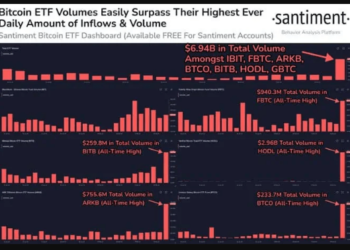An editorial by Professor Qi Ge, a member of the vechain Steering Committee and a physicist specializing in 2D materials, sheds light on the biotech innovations that are revolutionizing sustainability through the integration of the VechainThor blockchain. The proposed solution involves using graphene, an ultra-thin, highly conductive material, to create a scaffold for bacteria. By creating specific chemical groups on the surface of graphene that attract and support the process of electron donation by bacteria, a self-growing electrically charged system, similar to a fuel cell, can be created.
However, the temperamental nature of bacteria requires certain environmental conditions for stability. Monitoring and regulating these biofuel cells requires a complex system, possibly integrated into the VechainThor blockchain, to ensure stability, efficiency and seamless integration into the global sustainability network.
Vechain, curator of VechainThor, is leading this innovation by leveraging blockchain, trusted data, smart contracts and IoT technologies for real-world applications. The current focus is on creating digital ecosystems that will revolutionize global sustainability efforts. The integration of biotechnology and blockchain marks a transformative step towards a more sustainable and environmentally conscious future.
Image: Newsbit





















































































clomid generic brand clomid cost australia clomid for sale australia where can i get clomid pill how can i get clomiphene tablets where buy clomiphene price cost of cheap clomiphene pills
The depth in this piece is exceptional.
More articles like this would frame the blogosphere richer.
zithromax 500mg without prescription – flagyl order flagyl brand
buy cheap propranolol – buy inderal 10mg purchase methotrexate generic
buy cheap amoxil – combivent 100mcg generic buy combivent no prescription
buy azithromycin 500mg online – buy zithromax 250mg without prescription bystolic for sale
buy augmentin 625mg generic – https://atbioinfo.com/ buy acillin online
order nexium online – https://anexamate.com/ esomeprazole 20mg ca
coumadin drug – coumamide buy generic losartan over the counter
mobic 7.5mg cost – mobo sin meloxicam 15mg tablet
buy prednisone 40mg online – asthma prednisone 5mg brand
non prescription erection pills – https://fastedtotake.com/ best drug for ed
buy amoxicillin pill – comba moxi buy amoxicillin medication
purchase diflucan generic – buy diflucan 100mg generic buy generic diflucan
how to buy cenforce – https://cenforcers.com/# cost cenforce
cialis price cvs – https://ciltadgn.com/ cialis and cocaine
buy cheap ranitidine – https://aranitidine.com/# ranitidine 150mg canada
cialis super active reviews – strong tadafl overnight cialis
I’ll certainly bring to review more. https://gnolvade.com/
cheap kamagra/viagra – buy viagra online mastercard buy generic viagra online
More content pieces like this would urge the web better. https://buyfastonl.com/gabapentin.html
This is the kind of scribble literary works I positively appreciate. https://prohnrg.com/product/get-allopurinol-pills/
I couldn’t weather commenting. Profoundly written! https://aranitidine.com/fr/prednisolone-achat-en-ligne/
This is the kind of scribble literary works I rightly appreciate. https://ondactone.com/product/domperidone/
I’ll certainly bring to skim more.
https://doxycyclinege.com/pro/topiramate/
I couldn’t hold back commenting. Adequately written! http://bbs.51pinzhi.cn/home.php?mod=space&uid=7053848
dapagliflozin medication – https://janozin.com/ order generic dapagliflozin 10 mg
Thanks on sharing. It’s outstrip quality. https://sportavesti.ru/forums/users/clfyv-2/